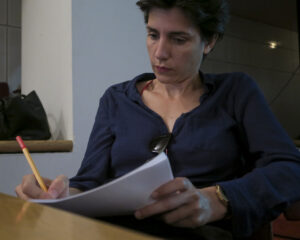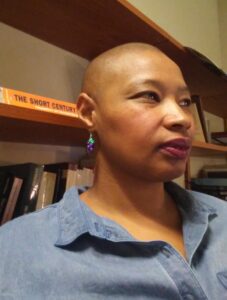Skola di Tarafe (Mangrove School). Written and directed by Filipa César & Sónia Vaz Borges (2022). Documentary, 34 minutes. Filmed in Guinée-Bissau. Portuguese-based creoles and pidgins, with English subtitles.
See it from anywhere in the world, at any time, throughout November. Access is free.
In this unique documentary, Filipa César, an experimental filmmaker and Sónia Vaz Borges, a militant historian, take us deep into the labyrinthian mangrove forest of Guinée-Bissau in West Africa to experience living there. In 1965, anti-colonial fighters resisted the Portuguese occupiers through the creation of a school system. Before 1965, around 90% of the population was illiterate. Education became the foundation of the liberation struggle. “They tried to prevent schools from existing. They would always try to bomb schools. You could not stay long in one place.” The mangroves became the safe haven where education could continue. The filmmakers capture the spirit of this resistance, in a beautiful, symbolic way. The filmmakers state: “We went to research the conditions of the students in the guerrilla schools in the mangroves. Instead, we soon became ourselves the learners and the first lesson was how to walk. In the mangrove school the learning happens with the whole body.”
“The filmmakers reinvest the mangroves as a place of transmission, of radical education, listening to the memory of struggles. The branches of the mangrove are powerful, inviting us to network, to work collectively and horizontally.”
Cinéma du réel Catalogue
Directors

Filipa César
Filipa César is an artist and filmmaker interested in the porous borders between the moving image and its reception, fictional dimensions of the documentary and the economies, politics and poetics inherent to cinema praxis. She uses media to expose counter narratives of resistance to historicism. Since 2011, César has been looking into the origins of cinema in Guinea-Bissau, its imaginaries and potencies, developing that research into the collective project Luta ca caba inda (the struggle is not over yet). She was a participant of the research projects Living Archive (2011-13) and Visionary Archive (2013-15) both organized by the Arsenal – Institute for Film and Video Art, Berlin. Selected Film Festivals include Curtas Vila do Conde, 2012-15; Forum Expanded – Berlinale, 2013 and 2016; Indie Lisboa, 2010 and 2016; DocLisboa, 2011. Selected exhibitions and screenings include: 8th Istanbul Biennial, 2003; Tate Modern, London, 2007; SFMOMA, 2009; 29th São Paulo Biennial, 2010; HKW Berlin, 2011-2015; Jeu de Paume, Paris, 2012; Kunstwerke, Berlin, 2013; SAAVY Contemporary, Berlin 2014-15, Futura, Prague 2015; Mumok, Vienna, 2016.

Sónia Vaz Borges
Sónia Vaz Borges, is an assistant professor in History and Africana Studies. She describes herself as a militant interdisciplinary historian and long-time social and political organizer. Born and raised in Portugal, she is the daughter of Cape Verdean immigrants to Portugal during the colonial occupation. Vaz Borges has a passion for interdisciplinary history, with a great focus on the silenced histories of people, and people’s actions and roles during historic moments of socio-political change. The liberation struggles and social movements around the world and the international solidarity, in relation to the fields of education and memories are some of her research interests. Her militant interdisciplinarity is made through an anti-colonial, decolonial and militant research and writing. Her most recent book Militant Education, liberation struggle and consciousness. The PAIGC education in Guinea Bissau 1963-1978, was published in 2019. The interdisciplinarity of her research practice can be found in various exhibitions and in film production. Together with a collective of militant filmmakers, Vaz Borges co-authored two short pieces. They are “Navigating the Pilot School” (2016) and “Skola di Tarafe / Mangrove School” (2022).
Cinematic Spaces of Education Festivalette
© All rights reserved
